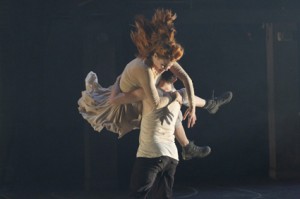Melanie Beddie and I appear in Keith Gallasch’s RealTime feature on Arts Education (RealTime 116).
We outline our ‘utopian’ vision for the BFA Theatre Practice at VCA and University of Melbourne. Please ask if you would like to see our (fuller) original response.
Glad that Keith used an image of our graduates Andrew Carolane and Annabel Marshall-Roth from Bagryana Popov’s great devised work Article One at VCA Theatre.
Read on for excerpts or click here for the full article at RealTime which includes interesting responses from Rosalba Clemente, Helen Trenos, Cath McKinnon, Peta Tait and Julian Meyrick.
Arts Education: Utopia and Horrors
Real thinking in an ideal vein
Keith Gallasch:Theatre/Performance
The university can be a haven for the developing performer, a place to learn, fail, experiment and take risks. It can be a site for safe creative interplay between students, lecturer performance makers and experienced artists seeking postgraduate refuge in which to reflect on their careers and to be challenged.

photo Jeff Busby
I asked teachers to share utopian visions for the training of students. It was clear they believed they were already achieving much, above all a sense of community, the transmission of expertise, intergenerational exchange and many ways of thinking and making, above all collaboratively, in an increasing range of forms. The common utopian wish is to make the student experience even more experiential, more immersive and more directly related to the industry in which students hope to be employed or, more importantly, that they will in the long-term create, having been trained to be inventive, flexible and independent.
In this scenario, industry comes to the theatre and performance school, participates in projects and recognizes, as Helen Trenos of the University of Tasmania puts it, that students are in fact emerging artists. As Flinders University’s Julian Meyrick argues, It’s time to get some solidarity back into our profession. To remember, that it is a profession, a lifetime’s commitment, not just a market niche…”
Meyrick urges “real thinking in an ideal vein” rather than ‘utopian,’ while Peta Tait at La Trobe University worries that inconsistencies in the tertiary sector risk making the sustained teaching of performance uncertain, with ramifications for the whole industry.
Melanie Beddie, Robert Walton, VCA Theatre
VCA Theatre Lecturers dramaturg Melanie Beddie and playwright Robert Walton emphasise the opportunity in the BFA (Bachelor Fine Arts, Theatre Practice) for students “to enter a community of extraordinary theatre artists all in the process of learning by doing and making.” The “comprehensively trained actor,” they believe, “will ultimately bring about change and improvement in their art form.” At the same time each will continue “to grow as a performer and theatre maker throughout their working life.”
This optimism is predicated on the belief that “the best makers of theatre have emerged from a context of understanding performance through an experiential immersion in it. In other words an embodied dramaturgy. We focus on enabling each year of actors to work well together. Of key importance is the ability to collaborate. The development and practice of the individual’s agency within the group is paramount.”
Beddie and Walton’s approach extends to a political vision: “When they work well, collaborative ensembles can offer models of alternative society, of sites of resistance, anarchy, radical democracy and inclusion. Staff and students repeatedly ask themselves Brecht’s question “what would you do to make the world a better place?” You can’t wait for some fabled time when you will be ‘ready’ to be an artist: rehearsals are never long enough, you could be more skilled, and there is always greater insight just around the corner. We look to the world and respond with what we have, wherever we are in our training. The practice of being an artist starts now: responding extraordinarily with what you have to hand.”
Rather than offering a ‘personal utopia’ of “becoming famous, becoming ‘someone,’” what Beddie and Walton say the VCA offers “is a set of skills that can allow people to live a life seemingly doing what they enjoy. In Marxist terms, working hard but not toiling. Creating standards of good work for oneself and choosing to live up to them is hard. Shouldn’t utopia be easy?”
Click here for the full article at RealTime.